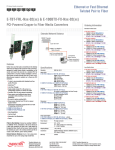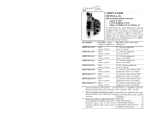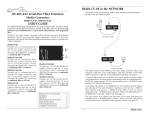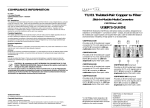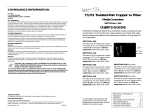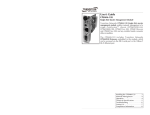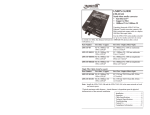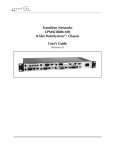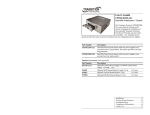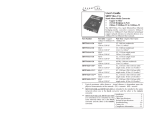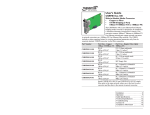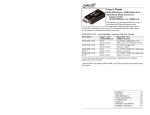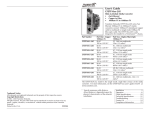Download Transition Networks CETTF10XX-105 User's Manual
Transcript
User’s Guide CETTF10xx-105 Slide-in-Module Media Converter • Ethernet • Copper to Fiber • 10Base-T to 10Base-FL Transition Networks CETTF10xx-105 series Ethernet 10Base-T to 10Base-FL media converters (designed to be installed in a PointSystem™ chassis) connect 10Base-T twisted-pair copper cable to multimode or single mode 10Base-FL fiber-optic cable. Part Number Port One - Copper 10Base-T RJ-45 100 m (328 ft)* RJ-45 100 m (328 ft)* RJ-45 100 m (328 ft)* RJ-45 100 m (328 ft)* Port Two - Fiber-Optic 10Base-FL ST, 850 nm multimode, duplex 2 km (1.2 miles) ST, 1310 nm single mode, duplex 20 km (12.4 miles) SC, 850 nm multimode, duplex 2 km (1.2 miles) SC, 1310 nm single mode, duplex 20 km (12.4 miles) CETTF1014-106 RJ-45 100 m (328 ft)* SC, 1310 nm single mode, duplex 20 km (12.4 miles) CETTF1015-105 RJ-45 100 m (328 ft)* SC, 1310 nm single mode, duplex 40 km (24.9 miles) CETTF1018-105 RJ-45 100 m (328 ft)* RJ-45 100 m (328 ft)* RJ-45 100 m (328 ft)* MT-RJ, 850 nm multimode, duplex 2 km (1.2 miles) ST, 1310 nm single mode, duplex 40 km (24.9 miles) ST, 1300 nm multimode, duplex 5 km (3.1 miles) CETTF1029-105* RJ-45 100 m (328 ft)* SC, 1310 nm (TX) / 1550 nm (RX) single fiber, 20 km (12.4 miles) CETTF1029-106* RJ-45 100 m (328 ft)* SC, 1550 nm (TX) / 1310 nm (RX) single fiber, 20 km (12.4 miles) CETTF1011-105 CETTF1012-105 CETTF1013-105 CETTF1014-105 CETTF1022-105 CETTF1027-105 * CETTF1029-105 and CETTF1029-106 are designed to be installed in the same network where one is the local converter and the other is the remote converter. The distances listed are the typical maximum cable distance. Actual distance is dependent upon the physical characteristics of the network installation. CETTF10xx-105 Installation Installation -- Continued Install the Slide-in-Module CAUTION: Wear a grounding device and observe electrostatic discharge precautions when setting the 4-position switch and the jumper and when installing the media converter. Failure to observe this caution could result in damage to, and subsequent failure of, the media converter. • The 4-position switch is located on the media converter circuit board. Use a small flat-blade screwdriver to set the switches (see the drawing). Copper Port; up = Enable AutoCross; up = Enable Link Pass Through; up = Enable 1. Carefully slide the slide-in-module into the installation slot, aligning the module with the installation guides. 2. Ensure that the module is firmly seated inside the chassis. 3. Push in and rotate the attached panel fastener screw clockwise to secure the module to the chassis front. 1 2 3 4 PWR TX PWR PWR LKS LA LKM RXF TX TX 0 50½ SPD PWR FRX FLNK CRX CLNK TX RX RX TX TX 100BASE-TX CFMFF100 Multimode RX CFETF110 TX 100BASE-FX D 10BASE-2 CFMFF100 LKC TX Multimode RX CPSMM120 RX LKF RX 10/100TX Multimode SERIAL 1. Fiber Port (10Base-FL) Up Enable network traffic on the fiber port. Down Disable network traffic on the fiber port. PWR RXF RXC E 10BASE-FL TX 10/100SX RX COL Link Alert Singlemode TX PWR LKS LKM RXC Singlemode Singlemode INIT TERM PWR LKS LKM RX LNK R E S E T 10BASE-T NOTE: When the fiber port or the copper port is disabled (switches 1 and 2), network traffic coming into the media converter is ignored and no traffic flows out. In this mode, the media converter is disconnected from the network. I 0 • Fiber Port; up = Enable I 0 Set the 4-Position Switch CAUTION: Wear a grounding device and observe electrostatic discharge precautions when installing the CETTF10xx-105 slide-in-module media converter. Failure to observe this caution could result in damage to, and subsequent failure of, the media converter. RX CETCF100 CFMFF100 CFETF100 RX 2. Copper Port (10Base-T) Up Enable network traffic on the copper port. Down Disable network traffic on the copper port. Panel Fastener Screw 3. AutoCross Up Enable AutoCross (see page 6). Down Disable AutoCross. (When AutoCross is disabled, the 10Base-T (copper) port is in MDI-X (crossover) mode.) 4. Link Pass-Through Up Enable Link Pass-Through (see page 6). Down Disable Link Pass-Through. (When Link Pass-Through is disabled, remote faults are not passed along to any downstream equipment.) Connect the Twisted-Pair Copper Cable NOTE: The AutoCross feature allows either MDI (straight-through) or MDI-X (crossover) cable connections to be configured automatically, according to the network conditions. 1. Locate or build 10Base-T copper cables with male, RJ-45 connectors installed at both ends. 2. Connect the RJ-45 connector at one end of the cable to the RJ-45 port on the CETTF10xx-105 media converter. 3. Connect the RJ-45 connector at the other end of the cable to the RJ-45 port on the other device (switch, workstation, etc.). Set the Hardware/Software Jumper The hardware/software jumper is located on the media converter circuit board. Use small needle-nosed pliers or a similar device to set the jumper. Hardware Software The media converter mode is determined by the 4-position switch settings. The media converter mode is determined by the most-recently saved, on-board microprocessor settings. S H Hardware Mode RJ-45 port on the media converter RJ-45 port on the other device (switch, work station, etc.) S H Software Mode 2 24-hour Technical Support: 1-800-260-1312 -- International: 00-1-952-941-7600 [email protected] -- Click the “Transition Now” link for a live Web chat. 3 CETTF10xx-105 Installation -- Continued Operation Connect the fber cable Status LEDs 1. Locate or build IEEE 803.2™ compliant 10Base-FL fiber cable with male, two-stranded TX to RX connectors installed at both ends. Use the status LEDs to monitor the media converter operation in the network PWR (Power) On = Connection to external AC power. 2. Connect the fiber cables to the CETTF10xx-105 media converter as described: • Connect the male TX cable connector to the female TX port. • Connect the male RX cable connector to the female RX port. LKF (Link - fiber) On = The fiber link is up. LKC (Link - copper) Off = A lack of power or a broken copper link. RXF (Receive - fiber) RXC (Receive - copper) Flashing = Data reception on the copper link. RX RX TX TX Power the Media Converter The slide-in-module media converter is powered through the Transition Networks PointSystem™ chassis. LKF LKC Connect the fiber cable to the other device (media converter, hub, etc.) as shown Flashing = Data reception on the fiber link. RXC PWR Connect the fiber cables to the other device (another media converter, hub, etc.) as described: • Connect the male TX cable connector to the female RX port. • Connect the male RX cable connector to the female TX port. Connect the fiber cable to the media converter as shown. On = The copper link is up. RXF 3. Off = A lack of power or a broken fiber link. SNMP Use SNMP at an attached terminal or at a remote location to monitor the media converter by monitoring: • Media converter power. • Copper link and fiber link status. • Copper receive and fiber receive status. • Hardware switch settings. • Fault condition. Also, use SNMP to enter network commands that: • Enable/disable the copper port . • Enable/disable the fiber port. • Enable/disable AutoCross. • Enable/disable Link Pass Through. • Power down the media converter. See the on-line documentation that comes with Transition Networks FocalPoint™ software for applicable commands and usage at www.transition.com. 4 24-hour Technical Support: 1-800-260-1312 -- International: 00-1-952-941-7600 [email protected] -- Click the “Transition Now” link for a live Web chat. 5 CETTF10xx-105 Operation -- Continued Cable Specifications Product Features The physical characteristics must meet or exceed IEEE 802.3™ specifications. Fiber Cable AutoCross™ When the AutoCross feature is activated, it allows either straight-through (MDI) or crossover (MDI-X) copper cables to be used when connecting to 10Base-T devices. AutoCross determines the characteristics of the connection and automatically configures the unit to link up, regardless if the copper cable is MDI or MDI-X configuration. NOTE: Factory default is “enable AutoCross.” Transition networks recommends leaving the device in the “enable” mode. Link Pass Through The Link Pass-Through feature allows the media converter to monitor both the fiber and copper RX (receive) ports for loss of signal. In the event of a loss of an RX signal (1), the media converter will automatically disable the TX (transmit) signal (2), thus, “passing through” the link loss (3). The far-end device is automatically notified of the link loss (4), which prevents the loss of valuable data unknowingly transmitted over an invalid link. media converter A disables the fiber TX link Near-End Device 1 Media Converter A original fault on the copper link 2 media converter B loses the fiber RX link 3 Media Converter B 4 Far-End Device media converter B disables the copper link NOTE: An enable/disable switch allows the Link Pass Through feature to be disabled. Link Pass Through may interfere with the Auto-Negotiation feature of other devices in networks where there are two media converters installed in series. Bit Error Rate: Single mode fiber (recommended): Multimode fiber (recommended): Multimode fiber (optional): <10-9 9 µm 62.5/125 µm 100/140, 85/140, 50/125 µm CETTF1011-105 CETTF1013-105 Fiber Optic Transmitter Power: Fiber Optic Receiver Sensitivity: Link Budget: 850 nm multimode 850 nm multimode min: -19.0 dBm max: -14.0 dBm min: -32.5 dBm max: -14.0 dBm 13.5 dB CETTF1012-105 Fiber Optic Transmitter Power: Fiber Optic Receiver Sensitivity: Link Budget: 1310 nm single mode min: -27.0 dBm max: -10.0 dBm min: -34.0 dBm max: -14.0 dBm 7.0 dB CETTF1014-105 CETTF1014-106 Fiber Optic Transmitter Power: Fiber Optic Receiver Sensitivity: Link Budget: 1310 nm single mode 1310 nm single mode min: -19.0 dBm max: -14.0 dBm min: -34.0 dBm max: -3.0 dBm 15.0 dB CETTF1015-105 Fiber Optic Transmitter Power: Fiber Optic Receiver Sensitivity: Link Budget: 1310 nm single mode min: -15.0 dBm max: -8.0 dBm min: -38.0 dBm max: -8.0 dBm 23.0 dB CETTF1018-105 Fiber Optic Transmitter Power: Fiber Optic Receiver Sensitivity: Link Budget: 850 nm multimode min: -16.0 dBm max: -10.0 dBm min: -29.5 dBm max: -7.2 dBm 13.5 dB CETTF1022-105 Fiber-optic Transmitter Power: Fiber-optic Receiver Sensitivity: Link Budget: 1310 nm single mode min: -15.0 dBm max: -5.0 dBm min: -34.0 dBm max: -14.0 dBm 19.0 dB CETTF1027-105 Fiber-optic Transmitter Power: Fiber-optic Receiver Sensitivity: Link Budget: 1300 nm multimode min: -19.0 dBm max: -15.0 dBm min: -32.5 dBm max: -14.0 dBm CETTF1029-105 CETTF1029-106 Fiber Optic Transmitter Power: Fiber Optic Receiver Sensitivity: Link Budget: 1310 nm (TX) / 1550 nm (RX) simplex 1550 nm (TX) / 1310 nm (RX) simplex min: -14.0 dBm max: -8.0 dBm min: -33.0 dBm max: -3.0 dBm 19.0 dB 13.5 dB The fiber optic transmitters on this device meets Class I Laser safety requirements per IEC-825/CDRH standards and complies with 21 CFR1040.10 and 21CFR1040.11. 6 24-hour Technical Support: 1-800-260-1312 -- International: 00-1-952-941-7600 [email protected] -- Click the “Transition Now” link for a live Web chat. 7 CETTF10xx-105 Cable Specifications -- Continued Technical Specifications Copper Cable For use with Transition Networks Model CETTF10xx-105 or equivalent. Category 3: (minimum requirement) Standards IEEE 802.3™ Gauge 24 to 22 AWG Attenuation 11.5 dB/100m @ 5-10 MHz Maximum Cable Distance 100 meters Category 5: (recommended) Gauge 24 to 22 AWG Attenuation 22.0 dB /100m @ 100 MHz Maximum Cable Distance 100 meters • Use straight-through (MDI) or crossover (MDI-X) twisted-pair cable. • Shielded twisted-pair or unshielded twisted-pair may be used • Pins 1&2 and 3&6 are the two active pairs in an Ethernet network . • Use only dedicated wire pairs for the active pins: (e.g., blue/white & white/blue, orange/white & white/orange, etc.) • Do not use flat or silver satin wire. Data Rate 10 Mb/s Dimensions 3.4" x 0.86" x 5.0" (86 x 22 x 127 mm) Weight 3 oz (91 g) (approximate) Power Consumption 2.3 watts MTBF* 408,000 hours (MIL217F2 V5.0) (MIL-HDBK-217F) 1,412,000 hours (Bellcore7 V5.0) Environment Tmra*: Storage Temp: Humidity: Altitude: Warranty Lifetime Straight-Through Cable Twisted Pair #1 1 2 1 2 Twisted Pair #2 3 6 3 6 Crossover Cable Twisted Pair #1 1 2 1 2 Twisted Pair #2 3 6 3 6 0 to 60°C (32 to 140°F ) -20 to 85°C (-4 to 185°F) 10 to 90%, non condensing 0 to 10,000 feet *Manufacturer’s rated ambient temperature: Tmra range for this slide-in-module depends on the physical characteristics and the installation configuration of the Transition Networks PointSystem™ chassis in which this slide-in-module will be installed. The information in this user’s guide is subject to change. For the most up-to-date information on the CETTF10xx-105 media converter, view the user’s guide online at: www.transition.com. WARNING: Visible and invisible laser radiation when open. Do not stare into the beam or view the beam directly with optical instruments. Failure to observe this warning could result in an eye injury or blindness. WARNING: Use of controls, adjustments or the performance of procedures other than those specified herein may result in hazardous radiation exposure. WARNING: If the media converter is an IEEE802.3-2005 Powered Device (PD) capable of receiving power via the Media Dependent Interface (MDI) leads, the power source, connector, and cabling attached to the barrel power connector must meet the isolation requirement specified in IEEE802.3-2005. Failure to observe this warning could result in an electrical shock. IMPORTANT Copper based media ports, e.g., Twisted Pair (TP) Ethernet, USB, RS232, RS422, RS485, DS1, DS3, Video Coax, etc., are intended to be connected to intra-building (inside plant) link segments that are not subject to lightening transients or power faults. Copper based media ports, e.g., Twisted Pair (TP) Ethernet, USB, RS232, RS422, RS485, DS1, DS3, Video Coax, etc., are NOT to be connected to inter-building (outside plant) link segments that are subject to lightening transients or power faults. Failure to observe this caution could result in damage to equipment. *MTBF is estimated using the predictability method. This method is based on MIL-217F at 25°C ambient temperature, typical enclosure heat rise of 10°C, and nominal operating conditions and parameters. Installation and configuration specific MTBF estimates are available upon request. Contact Technical Support. 8 24-hour Technical Support: 1-800-260-1312 -- International: 00-1-952-941-7600 [email protected] -- Click the “Transition Now” link for a live Web chat. 9 CETTF10xx-105 Troubleshooting If the media converter fails, isolate and correct the failure by determining the answers to the following questions and then taking the indicated action: 1. 2. 3. Is the PWR LED illuminated? NO • Is the media converter slide-in-module installed properly in the chassis? • Is the power cord properly installed in the chassis and at the external power source? • Does the external power source provide power? • Contact Tech Support: (800) 260-1312, Int’l: 00-1-952-941-7600. YES • Proceed to step 2. Is the LKC LED illuminated? NO • Check twisted-pair cables for proper connection. • Contact Tech Support: (800) 260-1312, Int’l: 00-1-952-941-7600. YES • Proceed to step 3. Is the LKF LED illuminated? NO • Check fiber cables for proper connection. • Verify that TX and RX cables on media converter are connected to RX and TX ports, respectively, on other device. • Contact Tech Support: (800) 260-1312, Int’l: 00-1-952-941-7600. YES • Proceed to step 4. 4. Is the RXC LED flashing? NO • If there is no activity on the 10Base-T port, proceed to step 5. • If there is activity on the 10Base-T port, disconnect and reconnect the 10Base-T cable to restart the initialization process. • Restart the workstation to restart the initialization process. • Contact Tech Support: (800) 260-1312, Int’l: 00-1-952-941-7600. YES • Proceed to step 5. 5. Is the RXF LED flashing? NO • If there is no activity on the 10Base-FL port, continue below • If there is activity on the 10Base-FL port, disconnect and reconnect the 10Base-FL cable to restart the initialization process. • Verify that TX and RX cables on media converter are connected to RX and TX ports, respectively, on other device. • Restart the workstation to restart the initialization process. • Contact Tech Support: (800) 260-1312, Int’l: 00-1-952-941-7600. YES • Contact Tech Support: (800) 260-1312, Int’l: 00-1-952-941-7600. 10 24-hour Technical Support: 1-800-260-1312 -- International: 00-1-952-941-7600 Contact Us Technical Support Technical support is available 24 hours a day. US and Canada: 1-800-260-1312 International: 00-1-952-941-7600 Transition Now Chat live via the Web with Transition Networks Technical Support. Log onto www.transition.com and click the Transition Now link. Web-Based Seminars Transition Networks provides seminars via live web-based training. Log onto www.transition.com and click the Learning Center link. E-Mail Ask a question anytime by sending an e-mail to our technical support staff. [email protected] Address Transition Networks 6475 City West Parkway Minneapolis, MN 55344, U.S.A. telephone: 952-941-7600 toll free: 800-526-9267 fax: 952-941-2322 Declaration of Conformity Name of Mfg: Transition Networks 6475 City West Parkway, Minneapolis MN 55344 U.S.A. Model: CETTF10xx-105 Series Media Converters Part Number(s): CETTF1011-105, CETTF1012-105, CETTF1013-105, CETTF1014-105, CETTF1014-106, CETTF1015-105, CETTF1018-105, CETTF1022-105, CETTF1027-105, CETTF1029-105, CETTF1029-106 Regulation: EMC Directive 89/336/EEC Purpose: To declare that the CETTF10xx-105 to which this declaration refers is in conformity with the following standards. CISPR 22:1993; EN 55022:1994+A1:1995+A2:1997; EN 55024:1998 Class A; FCC Part 15 Subpart B; EN 61000-3-2:1995; EN61000-3-3:1995 I, the undersigned, hereby declare that the equipment specified above conforms to the above Directive(s) and Standard(s). April, 12 2006_____ Stephen Anderson, Vice-President of Engineering Date [email protected] -- Click the “Transition Now” link for a live Web chat. 11 Compliance Information CISPR22/EN55022 Class A + EN55204 CE Mark FCC Regulations This equipment has been tested and found to comply with the limits for a Class A digital device, pursuant to part 15 of the FCC rules. These limits are designed to provide reasonable protection against harmful interference when the equipment is operated in a commercial environment. This equipment generates, uses, and can radiate radio frequency energy and, if not installed and used in accordance with the instruction manual, may cause harmful interference to radio communications. Operation of this equipment in a residential area is likely to cause harmful interference, in which case the user will be required to correct the interference at the user's own expense. Canadian Regulations This digital apparatus does not exceed the Class A limits for radio noise for digital apparatus set out on the radio interference regulations of the Canadian Department of Communications. Le présent appareil numérique n'émet pas de bruits radioélectriques dépassant les limites applicables aux appareils numériques de la Class A prescrites dans le Règlement sur le brouillage radioélectrique édicté par le ministère des Communications du Canada. European Regulations Warning This is a Class A product. In a domestic environment this product may cause radio interference in which case the user may be required to take adequate measures. Achtung! Dieses ist ein Gerät der Funkstörgrenzwertklasse A. In Wohnbereichen können bei Betrieb dieses Gerätes Rundfunkstörungen auftreten. In diesem Fäll ist der Benutzer für Gegenmaßnahmen verantwortlich. Attention! Ceci est un produit de Classe A. Dans un environment domestique, ce produit risque de créer des interférences radioélectriques, il appartiendra alors à l'utilsateur de prende les measures spécifiques appropriées. In accordance with European Union Directive 2002/96/EC of the European Parliament and of the Council of 27 January 2003, Transition Networks will accept post usage returns of this product for proper disposal. The contact information for this activity can be found in the 'Contact Us' portion of this document. CAUTION: RJ connectors are NOT INTENDED FOR CONNECTION TO THE PUBLIC TELEPHONE NETWORK. Failure to observe this caution could result in damage to the public telephone network. Der Anschluss dieses Gerätes an ein öffentlickes Telekommunikationsnetz in den EG-Mitgliedstaaten verstösst gegen die jeweligen einzelstaatlichen Gesetze zur Anwendung der Richtlinie 91/263/EWG zur Angleichung der Rechtsvorschriften der Mitgliedstaaten über Telekommunikationsendeinrichtungen einschliesslich der gegenseitigen Anerkennung ihrer Konformität. Trademark Notice All trademarks and registered trademarks are the property of their respective owners. Copyright Restrictions © 2001, 2003 - 2005 Transition Networks. All rights reserved. No part of this work may be reproduced or used in any form or by any means - graphic, electronic, or mechanical - without written permission from Transition Networks. Printed in the U.S.A. 33204.E








